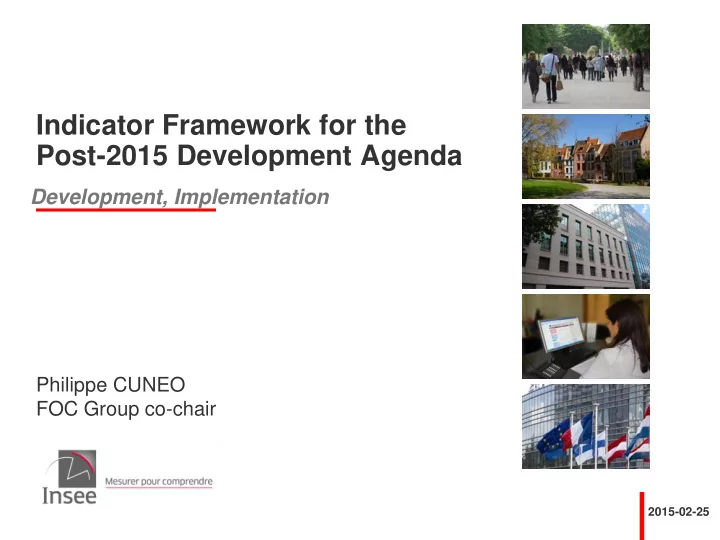

Indicator Framework for the Post-2015 Development Agenda Development, Implementation Philippe CUNEO FOC Group co-chair 2015-02-25
Developing an Indicator Framework: Contents of the Presentation - The mandate of the Friends of the Chair Group on Broader Measures of Progress has evolved… - This can be seen in its past and future work - The timetable for the Indicator Framework is at present the following (but it could change) - This framework needs to take into account: the articulation of 3 levels of monitoring the assessment of present countries Capabilities the need for a data revolution - As a consequence: 3 proposals for discussion of the Statistical Commission Expert Working Group – New York 25 February 2015 15-02-25 2
Mandate of the Friends of the Chair Group on Broader Measures of Progress - The Friends of the Chair Group was created in March 2013 - Its mandate has been extended until March 2016 and has become double: Contributing to the negociation process of the Post-2015 Development Agenda by insuring a robust statistical support Developing a consensus on Broader Measures of Progress - Supporting the negotiation process has been its main concern lately Expert Working Group – New York 25 February 2015 15-02-25 3
Work Programme of the FOC - March 2014: transmission of a compendium of 29 Statistical Notes to the Open Working Group - October 2014: Global Survey on Data Availability - March 2015: Provisional List of Indicators for the intergovernmental Negotiation Process - Throughout 2014: Answering with the help of countries any OWG demands Questioning Countries on their Broader Progress Agenda - Throughout 2015 and 2016: Supporting the Intergovernmental Negotiation Process until new entities are operational Defining a consensus on broader measures of Progress Expert Working Group – New York 25 February 2015 15-02-25 4
Timetable for the Indicator Framework - January-July 2015: Intergovernmental Negotiations: - 2015: Definition of the Indicator Framework February 2015: Expert Group Meeting March 2015: Statistical Commission and related propositions from the FOC Group July 2015: 1st Proposal of an Indicator Framework September 2015: Formal adoption of the post-2015 Agenda End of 2015: Update of the Indicator Framework - 2016 (tentative): Adoption of the Indicator Framework Feb 2016: Adoption by the Statistical Commission of a proposition for the Indicator Framework End of Year 2016: Official Adoption of the Framework Expert Working Group – New York 25 February 2015 15-02-25 5
Development of the Indicator Framework: 3 strategic constraints - Articulating Global, Regional and National monitoring, which should be based on: Comparable and standardized data National Reporting mechanisms (ownership) - Addressing the probable mismatch between the ambition of the common framework and countries capabilities - Implementing the data revolution Expert Working Group – New York 25 February 2015 15-02-25 6
Developing the Indicator framework Assessing country capabilities - The FOC has initiated a survey on data availibility based on the 107 substantive targets 91 countries responded (38 developed and 53 developing countries); 17 from Africa, 32 from Europe, 17 from Latin America and the Caribbean, 2 from North America, 8 from Central and West Asia, 12 from East, South and Southeast Asia and 3 from Oceania For 52 out of the 107 substantive targets, at least 60% of countries indicated data availibility to measure at least one indicator Almost all targets from goals 1 to 6 are measurable for more than 60% of countries ; the situation is not so bright for new areas located at the end of the goal list; nevertheless it is good news! It is not straightforward that developing countries show better results than developed ones; this might be explained partly because the former are more experienced in collecting development data. - A new survey has just been launched by the UNSD regarding the provisional list of indicators to be produced for the next meeting of the Intergovernmental Negotiation Expert Working Group – New York 25 February 2015 15-02-25 7
Developing the Indicator Framework: 3 needs to be taken into account - Definition of the list of Indicators and of the monitoring framework: bringing together experts from Agencies and Countries on the model of the IAEG-MDGs towards an Inter-Agency Expert Group on SDGs - Establishing a global partnership for Coordination and Capacity building Discussing strategy, funding and common data infrastructure towards a (high level) Group starting from existing initiatives? - Addressing regularly the data revolution: bringing together all data producers and users taking advantage of existing mechanisms towards a Forum on Development data? Expert Working Group – New York 25 February 2015 15-02-25 8
Indicator Framework for the Post-2015 Development Agenda Thank You! Insee 18 bd Adolphe-Pinard 75675 Paris Cedex 14 France www.insee.fr
Recommend
More recommend